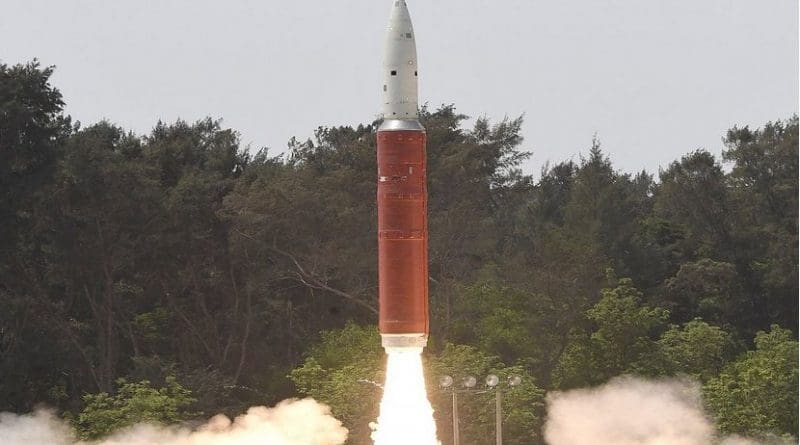India’s Space Program And Deterrence Stability Of South Asia – OpEd
Outer space has become a key component of military power projection for the world’s major powers. The weaponization of outer space is also a global tragedy as it has always remained a neutral and ‘shared heritage’ for all of mankind. Only a few countries which include the US, Russia, China and India have been able to develop their space programs. Space resources facilitate military operations and also provide assistance in making crucial battlefield decisions.
As a result, the increasing dependence of armed forces on outer space assets for communication and operational tasks make them increasingly valuable. In this regard, the world’s great powers are attempting to militarize and command this sphere to pursue their strategic goals.
Military presence in outer space is one of the components of India’s long-term hegemonic designs. In pursuit of its regional and global dominance, India is involved in several advanced missile development programs. India though claims to utilize space for peaceful purposes, but ended up in space weaponization. This shift also changes India’s policy from simply having a presence in space to projecting power there. Colin Gray a renewed strategist described space power as ‘a state’s ability to use space while denying its reliable use to any foe’. In India’s case, it has the capability to use space but not have enough counter space capability.
India first Anti-Satellite (ASAT) missile test on March 2019 is a considerable sign that India is on the verge of developing counter space capability. After its successful ASAT test, India has become one of the few countries after the US, Russia and China to have the capability to destroy objects in space. ASAT weapons are specifically designed to destroy the adversary’s space assets, blinding them or disrupting communication networks, thereby providing India a major military advantage. The successful test of ASAT has thus made India more confident in its space program’s capabilities.
In a recent development, India is going to conduct its first simulated space warfare exercise in July 2019. These exercises termed as ‘IndSpaceEx’ are designed to gain a better appreciation of the existing and emerging challenges in the space security sphere by creating a real time war scenario.
These exercises would be conducted to assess India’s major space vulnerabilities, requisite space and counter space capabilities and also highlight the gaps within these capabilities during conflict. The conclusion of these war games would assist policy makers to develop space policies accordingly. These exercises will also help India in grasping its related strategic challenges and to take appropriate measures for effective deterrence in space.
Space modernization carried out by India shows that the country is steadily expanding its focus on missile development from the conventional and nuclear realms towards the space domain. It is also worth noting that these developments were also focused on gaining certain political objectives. It has been argued that India’s anti-satellite test was only to hype the Indian public’s emotions for political gains in the recently held general elections. But India’s plans to conduct war-games demonstrate that India is on route to practically test its counter space capabilities to minimize the threats posed especially by China’s growing space program.
India’s quest for space weaponization touches a number of key issues which endanger the regional and international security environment. At the regional level, South Asia is marred by mutual hostility between India and Pakistan. These ongoing Indian space developments threaten to adversely affect the strategic stability in the region, which ultimately could lead to an inevitable arms race between both states in the domain of space. Pakistan should take these developments seriously as it forms a key of part of India’s future military plans and take measures accordingly.
At the global level, this creates a debate on outer space policy, politics, and the weaponization of space. The international community has also expressed its concerns regarding the resulting space debris from India’s ASAT test, which would likely have a drastic effect on the existing operational satellites.
In all, space has become a new theatre for major military powers in pursuit of their military doctrines. Major Powers are in competition for securing space assets and to effectively utilize them for future warfare. These advanced space technologies could play a decisive role in modern warfare. India’s desire of presence in space and the acquisition of advanced intelligence, surveillance and reconnaissance (ISR) systems which are meant to facilitate military strategies for conducting offensive military operations at the present pose serious concerns for Pakistan as well.
*Author is Research Associate at Strategic Vision Institute Islamabad.


defense spending cannot run on ‘aalmi zakat’ or International alms. pakistan is irrelevant to India’s ASAT paradigm as much as it would like to flag its ‘ability for nuisance’ and pretend that the same passes for robust deterrence strategy.
sadly, zulfikar ali bhutto’s cry to ‘eat grass’ and keep up with India vow has made remarkable progress from 1974 to 2019 (45 years) . Another ten years of sustained military spending by pakistan would be a boon for India. As of now, pakistan is gladly obliging and seeing deluded dreams about resisting non-existent indian hegemonical designs and other elements in its figment of imagination.